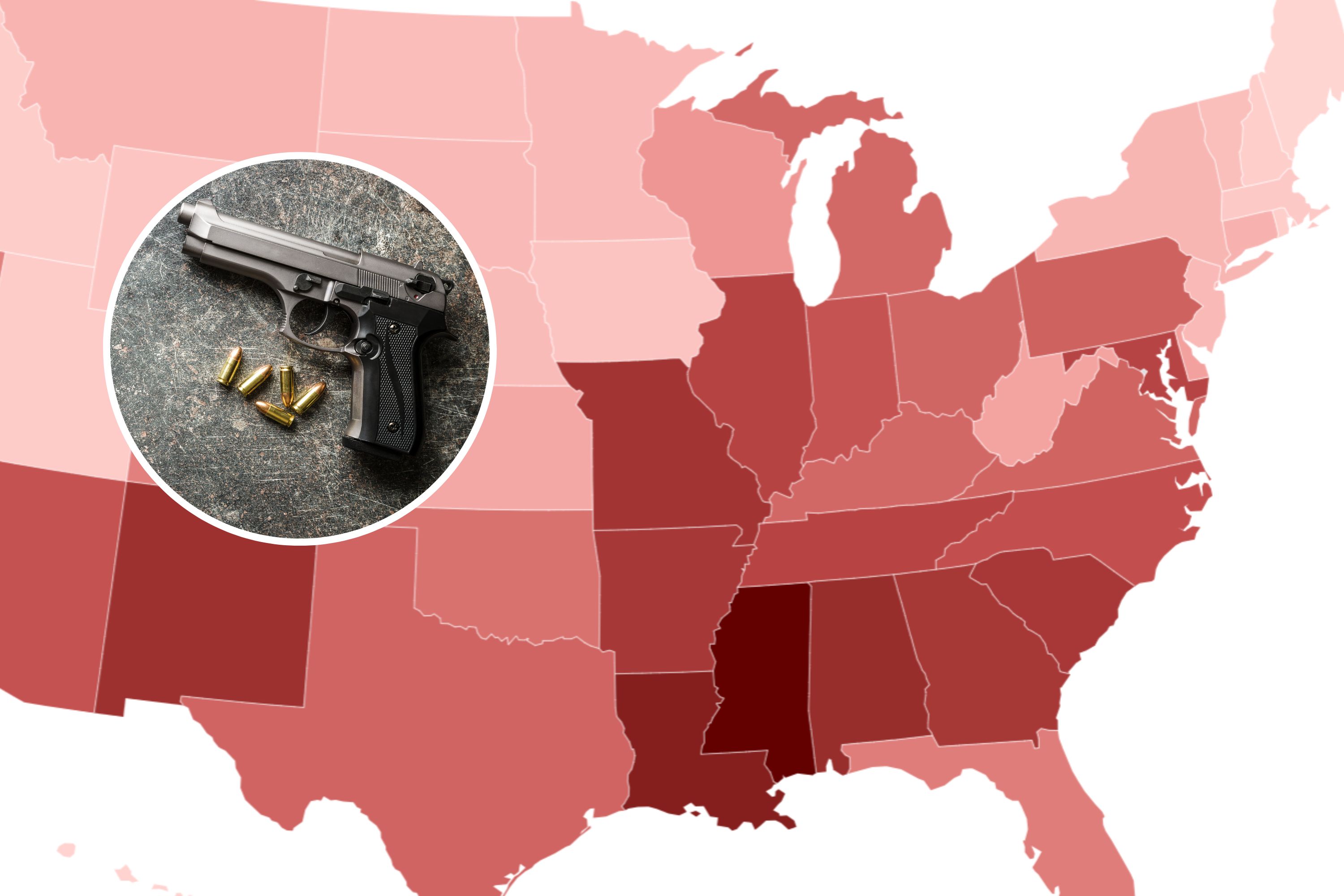As the occupants of a high-rise apartment block in western Shanghai sang from their windows in the third week of China's harshest COVID lockdown since the beginning of the pandemic, a small drone carrying a loudspeaker sought to quell their benign protest with a dystopian message: "Dear residents ... Please strictly comply with the municipal government's epidemic prevention regulations. Control your soul's desire for freedom and refrain from opening your windows to sing. This behavior carries a risk of transmission."
Like many countries in the West, the United States has done away with most rules surrounding public health. Some argue the measures were never restrictive enough to be begin with. America's nearly 1 million COVID-19 deaths are now the go-to gibe in Beijing whenever Washington mentions the condition of human rights in China, where the death toll remains at a little more than 4,600.
With nearly 90 percent of China's population fully vaccinated, many observers outside the country—and some within—are wondering why policymakers still refuse to abandon their "zero-COVID" approach, despite fears that the strategy is becoming untenable.
In Shanghai, the eastern port city of 25 million, there was a sign of Beijing's lingering anxieties when Sun Chunlan, vice premier, arrived over the weekend. In spring 2020, Sun was dispatched to Wuhan, and wasn't recalled from central China until after the city had ended its lockdown. Her appearance in China's financial capital came on the back of a month of record daily cases, which continue to rise due to the Omicron BA.2 variant, in what has quickly become the country's most alarming outbreak in its most populous city.

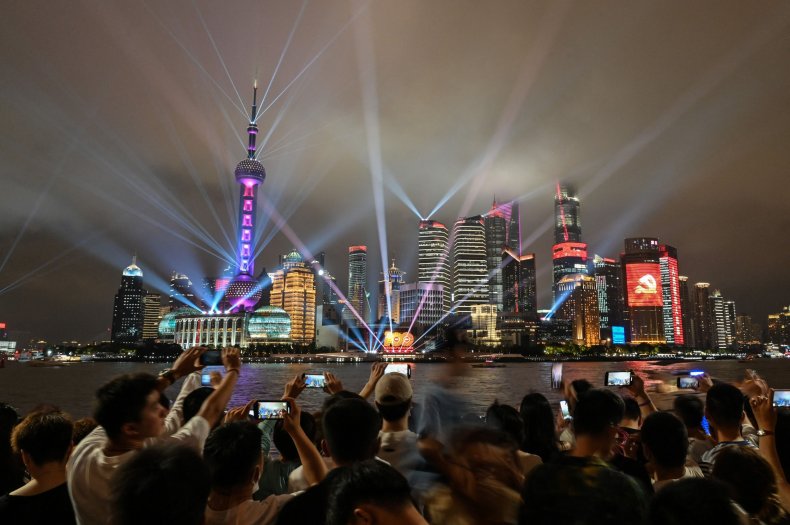
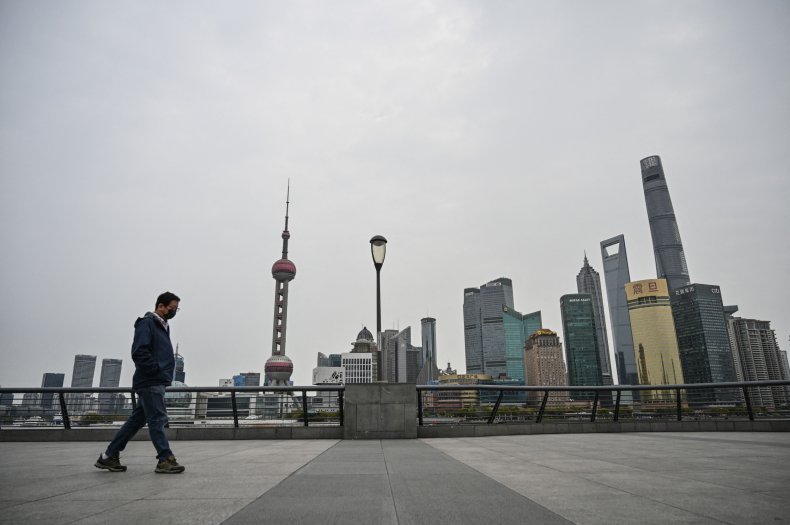
The megacity has been at a standstill since late March. Citywide testing is underway, and exhibition centers are being converted into centralized quarantine facilities in moves that evoked scenes from Wuhan, which was abruptly shut down in order to stem a disease whose lethality wasn't fully known. But in Shanghai, where residents found themselves confined to their homes, workplaces and, in one case, even a public toilet as part of the sweeping clampdown on the virus, the recent surge has so far produced one severe case and no deaths, according to official data, despite a buildup of more than 100,000 mostly asymptomatic cases in the new epicenter.
Upon arrival, however, Sun—the only woman on the Chinese Communist Party's powerful 25-member Politburo—dashed any idea the leadership might change tack from what it calls "dynamic zero COVID"; on the contrary, Beijing is doubling down.
Sun ordered local health officials to "act quickly and forcefully" to stop the spread of the virus, stressing "unswerving adherence" to China's zero-tolerance approach by mandating lockdowns, centralized quarantine and mass testing. Tens of thousands of beds will be made available to isolate patients, and the military has been called in to assist.
Sun has put the city on a war footing not seen since workers erected emergency field hospitals in Wuhan, operations she was tasked with overseeing.

A Costly Trade-Off
Shanghai's chaotic response to the crisis suggests local leaders were woefully unprepared to impose such stringent measures.
Last month residential neighborhoods where positive cases were found were sealed off, and officials took a stepped approach to containment to protect the economy. The municipal government drew up plans for a two-stage snap lockdown that would split the city in two by the Huangpu River. But on March 27, an indefinite COVID shutdown was extended citywide, catching many residents and officials off guard.
This job is not a job—it's costing me my life. Sun Chunlan is here. I hope she has good policies.
Decision-makers were well aware of the economic impact of a full lockdown of Shanghai, a financial hub home to vehicle and electronics plants as well as semiconductor suppliers, and the world's busiest shipping port. The day before the announcement, Wu Fan, a member of the city's pandemic response team, told reporters: "If Shanghai, this city of ours, came to a complete halt, there would be many international cargo ships floating in the East China Sea," he said. "This would impact the entire national economy and the global economy." This week, French investment bank Natixis slashed China's 5.5 percent GDP growth targeted by 1.8 percentage points for the first quarter.
Yanzhong Huang, a senior fellow for global health at the Council on Foreign Relations, describes Shanghai's COVID policy U-turn as a "strange twist."
Each locality is held accountable for disease control, failing which Beijing can use its "central playbook," he says. "For the supporters of that policy, it's not just politically justifiable, it also makes sense from a public health perspective, especially when they foresee a worst-case scenario."
According to some projections, abandoning the zero-COVID strategy could overwhelm China's healthcare system and lead to more than 1 million deaths. "But the question here is to what extent the worst-case scenario is likely. I think many of the policymakers, those who believe the zero-COVID approach, overestimate the likelihood," he says.
Huang notes factors including China's high vaccination rate and epidemiological data from Shanghai and Hong Kong that show Chinese-made inactivated vaccines can significantly reduce the risk of severe cases and death.
"In my opinion, there is a better, more cost-effective approach that may not be able to avoid the surge of cases when opened up, but it can minimize the damage by minimizing the number of fatalities and severe cases; by, more importantly, avoiding disruption to society and the economy," he says.
It would call for boosting the country's public health surge capacity, educating the public about the risks of the virus, effective triage procedures, and aggressively vaccinating the elderly. "This would represent a more viable alternative to the zero-COVID strategy," says Huang, who is also a professor at Seton Hall University.
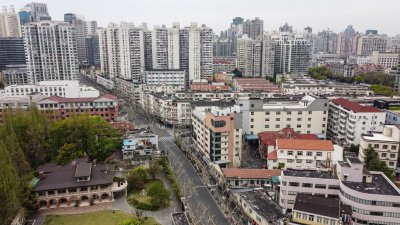
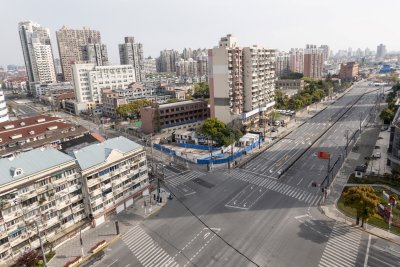
Hints of Unrest
The social impact of the governments's decision was felt in days.
China's social media platforms are awash with videos of residents protesting about a lack of daily necessities including food, water and other forms of welfare support. Images emerged of standoffs between citizens and police, and instances of micro-level cruelty against people and animals, performed in the name of upholding the law. One grim example saw a worker in a hazmat suit beat a corgi dog to death with a shovel, after its owner had been taken into quarantine, according to one social media account. The inspector was apparently concerned that the pet could inadvertently spread the virus.
This debate on zero COVID or coexistence with the virus is no longer just a debate between which method works better. It's characterized now as a competition between two political systems, even two civilizations.
In another case of helplessness, a mother in Shanghai complained of inadequate social distancing enforcement in a phone call with her neighborhood health official, only to be met with surprising frankness from the woman on the other end of the line. In a recording of the nine-minute conversation, the sobbing official said her supervisors weren't taking her calls, and that she'd rather be isolating at home too, instead of dealing with irate residents who were likely carrying COVID. "This job is not a job—it's costing me my life," she cries. "Sun Chunlan is here. I hope she has good policies."
The inhabitants of Shanghai have become the living embodiment of the Chinese proverb "the crying child gets the milk"; however, it's hard to say whether social grievances will lead to a meaningful change in the government's approach.
Politics Lead the Way
It may be that fewer and fewer experts see the practical merits of continuing a similar policy in any country at this point in the pandemic.
But inside Zhongnanhai, zero COVID emerges from a specific assessment about continued socio-political stability in 2022, a year in which China's President Xi Jinping is expected to tout his political achievements as reasons to be re-elected at the CCP's 20th National Congress this autumn. Accordingly, party ideology is part of the approach to public health.
In an April 6 letter from the CCP's Shanghai Committee, members were told to bravely "draw swords and fight" against actions that interfere with or undermine the anti-epidemic battle. "Those who step forward in critical moments and risk everything in times of crisis are real Communists," it read.
The Chinese public doesn't directly vote its national leaders into power, but the legitimacy of the leadership matters. There's no question that China's successful containment of COVID compared to the West has won Xi overwhelming support at home.
April 8 marks the second anniversary of Wuhan's lifting of its 76-day lockdown in 2020. Two months after the city reopened, at the delayed "Two Sessions" political convention in Beijing, the CCP all but declared victory over the virus, while the West had yet to experience the worst of the disease. In public addresses since, Xi has put his country forward as a leader in global health. China reported its first COVID deaths in over a year last month.

At the government's agenda-setting Central Economic Work Conference in December, an official policy statement included the word "stability" 25 times. On March 17, Xi told the CCP's Politburo Standing Committee that China would seek "maximum effect in prevention and control with minimum cost" in order to reduce the impact of COVID measures on economic and social development. When Xi gave those remarks, infections in Shanghai represented less than 15 percent of all cases in China. Three weeks later, the city's outbreak now accounts for more than 85 percent of the nation's cases.
According to Huang, the Chinese president's directive last month was an attempt to balance the benefits against the cost. "But I think now it appears this targeted, scientific approach has given way to a more heavy-handed, politicized approach. This ultimately is a political decision, not made by the public health officials," he says. "You see how this is being characterized essentially. This debate on zero COVID or coexistence with the virus is no longer just a debate between which method works better. It's characterized now as a competition between two political systems, even two civilizations."
Xi's Last Word
Zero COVID is over when Xi says it's over, argues Steve Tsang, professor and director of the SOAS China Institute in London. "What underpins the priority accorded to stability is the imperative Xi has to ensure a third and therefore unlimited term of office at the 20th Party Congress," Tsang says.
"The zero-COVID policy is a policy laid down by Xi, so it cannot be abandoned unless and until Xi sees its continuation as more damaging to him than otherwise"—and there's no evidence of that, he says. "Ultimately, it is Xi's hold to power that is the top priority of the Chinese government."

To reach a point where the strict measures are no longer needed, Huang says Beijing needs to be wary of the policy becoming self-defeating. "You have a large percentage of the population that is vulnerable to the virus, that can feed the virus, and the virus won't go away until it's infected 50 percent of the population. As long as the pandemic is still there, the risk continues to be there. The zero-COVID strategy, even though it can contain the spread, cannot change that immunity gap significantly. In a way, the zero-COVID strategy sustains that immunity gap, maintaining the presence of a large segment of the population that is still vulnerable."
China's health experts, many of whom were present during the SARS epidemic two decades ago, will understand these hard truths. But it's for the political leadership to decide whether to discard a once-successful approach that may be unsustainable in the long run, or to risk an indefinite gamble on social compliance. In the meantime, the government's conviction in its policy remains unshaken. Mi Feng, the spokesperson for China's National Health Commission, told a press conference on April 6 that the country would adhere to dynamic zero COVID, seemingly until the pandemic is over.
The NHC didn't return Newsweek's requests for comment.
Locking down a megacity like Shanghai, a financial hub and home to the world's busiest shipping port, comes at a high cost. For Xi Jinping, facing an upcoming election, the cost of not doing so appears to be unimaginable.
Uncommon Knowledge
Newsweek is committed to challenging conventional wisdom and finding connections in the search for common ground.
Newsweek is committed to challenging conventional wisdom and finding connections in the search for common ground.
About the writer
John Feng is Newsweek's contributing editor for Asia based in Taichung, Taiwan. His focus is on East Asian politics. He ... Read more



